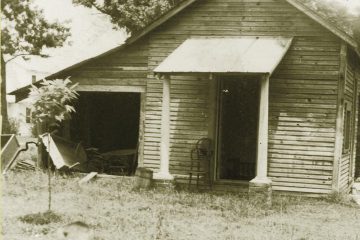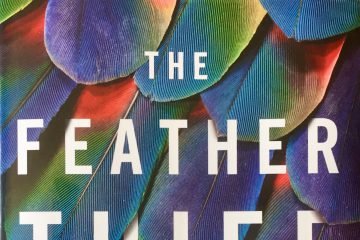

Firstly, I have to say that I found myself oscillating between childlike delight and writer-ly admiration through my reading of ‘Where We Go…’. The scope of what you create visually had me wondering at many points, how much of what we see on the page is your imagination versus research. Were the folk tales familiar material when you started to write, or did you have to really dive into them, dig around and more importantly did you ever find yourself going down rabbit holes with them? 🙂
I knew some of the more famous tales like Momo Taro (the Peach Boy) and Urashima Taro, but read most of the tales for the first time when I lived in Japan for a couple of years (I taught English lessons at Mitsubishi, Sharp, and Hitachi factories). I’ve always been interested in folklore and mythology, so being in Japan for an extended period allowed me to not only read origin stories and explore Japanese cryptids, but also travel to some of the regions where particular tales really had a history. So, as far as going down rabbit holes with these tales? Sure, and I think that’s an important part of the process for any writer, so long as that research doesn’t become a tool for procrastination when writing needs to be done.
That’s exactly what I’m most afraid of when using lore. That the research will become an excuse for not getting down to the writing! Okay, so you do the research, you find yourself fascinated and there’s all this amazing material you want to use. But from a craft point-of-view, fairytales/folktales and other existing material can sometimes become like walking to the edge of a cliff in the dark. You can’t tell when you need to leap off with your own narrative. And you can land quite flat without the right instincts for timing and rhythm. But there is such deftness in the way you weave in and out of the folklore. How do you know (to take my crazy analogy further) where the lore needed to fade out and your narrative needed to take off that cliff?
Well, I generally like to do research long before I write and I generally don’t start writing until I’ve had an idea in my head for months. I want to internalize research and character sketches and potential plot points, so I don’t need to refer to a lot of notes, which is usually where I find myself being pulled out of storytelling and wondering about borders. I think another thing that helps me blend folktale and my own narrative is reminding myself that the folktale or monster is there to inform character or illuminate an aspect of humanity and not be taking center stage just because I think it’s cool or interesting. Sometimes this process takes the form of asking questions like: How would this affliction affect someone’s marriage? What kind of jobs would exist in this world? What pressures would such a job place on a person and their family? More questions = more possibility and more chances for connection and disconnection between people and self.
Why the title? I love every title in this collection: Monster Land, Girl Zero, Kenta’s Posthumous Chrysanthemum, they’re all as intriguing. And I do think Where We Go When All We Were Is Gone has this nice musicality to it too. But I’m curious why you chose it.
I honestly can’t remember when I came up with this title, but it pre-existed the collection and the titular story by many years. It was one of those things that I liked because it was both ephemeral and dug at human experience, but I didn’t have a home for until I wrote the dance party in a dystopian Tokyo story. When I was considering titles for the book I pretty quickly went with Where We Go since I felt it encapsulated both the aesthetic and the sense of loss that permeated most if not all of the work.
Now a more brass tacks sort of question: From a publishing point of view, how did you go about introducing this collection? Did you find yourself tweaking/editing or attaching labels to it? I worry sometimes the literary world has one too many labels. Did these make it easier to explain the content of your expansive imaginings in what often become reductive query letters?
Well, I suppose other people have put me in the ‘fabulism’ camp, which is essentially magical realism minus the Latin American origin or context. Some might call this kind of writing slipstream. (As you pointed out, categories in both the speculative and literary worlds can be a bit meaningless sometimes). I found it more helpful to consider comparison authors and titles when talking about my work—Kelly Luce’s Hana Sasaki Grows a Tale, the work of Kij Johnson, the formal and genre play of writers like Amelia Gray and Alissa Nutting etc. When I first started thinking about a home for the collection I started talking to agents first since agents were already contacting me based on short stories. Of course, as you probably know, collections are a hard sell with the NYC publishers even though a lot of editors and agents love them. Taking the experimental form of my collection, its shorter length, and the fact that my novel wasn’t ready into consideration meant I had a bit of an uphill battle. I was also on the academic job market at the time, so I desperately needed a book to apply to tenure-track jobs. Fortunately, when I started submitting to established small presses and contests, Black Lawrence Press called me up and they’ve been a pleasure to work with.
Loss is this overarching theme that stands out through “Where We Go..”. And yet you do it with this inclusive, almost empathetic humor. ‘The Inn of The Dead’s Orientation for being a Japanese Ghost’ had me laughing out loud at the winks to pop culture but also it reaffirms our frivolities as humans, even in death. Where does this lens come from? (It’s not this brand of queasy dark humor. It’s more delicate, I’ll-make-you-laugh-at-yourself-with-empathy humor). Do you think about these nuances in the way we talk and write about loss?
Hmm, this is a tough one. I suppose I’m the kind of person who is often drawn to the dark but also has a wry (and sometimes perverse) sense of humor. My wife and I get excited by animal (and human) bones at antique/curio stores, but I’m just as likely to hunker down for a bad Nicholas Cage movie marathon. So, I’m weird. That’s part of it. But I also think that moments of humor are welcomed moments of pause when writing about death and loss. And of course there is not just one way to grieve and remember a loved one. Some people cry and collapse like the wife in Kenta’s Posthumous Chrysanthemum while others, like her husband, get to work and find a project that honors the dead. And some people even laugh because it might be appropriate for a lost loved one or because the alternative is unthinkable.
I really enjoyed the vignettes you placed between stories or prefaced with. They’re the treasures I didn’t expect to find when I picked up the book. I especially love the one about rotting fruit: “A rotten fruit may be grumpy and surly, grunting when squeezed… Pay attention to the sound in your hands”. It’s such wonderfully descriptive writing that doesn’t have to try too hard. We’ve all known those fruits! Or the Recipe for Placenta Bloody Mary! Did you write those in afterwards or were those thoughts that popped up, mid-writing?
Oh yes, I wrote those after the stories as a way of 1) pulling the collection together a bit more and 2) providing moments of rest between stories especially considering the heavy/depressing subject matter of the book.
What were some of the thoughts you had while placing this collection in order? What was, for instance, the thought behind opening with this post-apocalyptic nuked and Godzilla-infested world in Return to Monsterland as versus the more folk-tale based Passage of Time In The Abyss?
Well, I think it’s always good to start strong and end strong. In a perfect world every story will be a winner, but that’s a rare collection and, of course, some stories will just resonate more with others and that’s something you can’t really control. Story collections are mix-tapes, albums. For this book I started with The Return to Monsterland because it had been getting great response at readings, people had emailed me about it after reading it in Conjunctions (and later at Joyland), so I knew it was a story that would help the book start off with a bang while also signaling to the reader that formal play would be something to expect. The Passage of Time in the Abyss, as you point out, is more folk-based and probably would have been more of an obstacle to surpass if it started the collection.
As a writer who doesn’t speak or write American, it often hits me that where I come from, we tell stories in English and other languages by giving them our own lilt and musicality. When re-telling our thought in American the meaning isn’t lost but it does slightly shift. When handling fairytales or folk narratives from Japanese, which is also a distinctly unique language with its own rhythm and essence, did that ever strike you as important or challenging? Or was it something that came naturally? I guess what I’m asking you to please share with me as a novice writer is: how do you convince yourself of your ability to tell this story in your unique voice? 🙂
Something I tell students who are playing with the fantastic or futuristic is that they just need to own their story from the get go and get rid of lines that are apologetic or pandering to readers. If you tell a reader without making qualms about it that a world is full of inter-dimensional vortexes then I’m more likely to accept it versus question logistics and believability. I think since I was always a reader of myth as an anthropology major (and an A&E documentary nerd before that), the voice and confidence came probably earlier than it would have otherwise. I never really saw the tales I was drawing from as this complete “other” but existing on a continuum as the same stories I was telling.
When is your next book coming out? Please tell us something– as much as you’d like to– about it.
I’m sending my second collection, How High We Go in the Dark, to my agents this week and my novel, Girl Zero, will be sent to them by the end of the summer. So it all depends on revisions and how shopping those manuscripts with publishers go. Fingers crossed!
How High We Go in the Dark is probably a bit more traditional in form (but still somewhat playful in terms of genre). Like Where We Go When All We Were Is Gone, the collection deals with loss but is more pointed on its focus on death, funerary practices, and how people grieve.
Girl Zero is a coming-of-age novel that centers on the genetic clone of a couple’s deceased daughter who eventually becomes the nexus of a worldwide epidemic of complete memory loss. You may recognize the title from a story from my first collection and yes, that story is essentially a watered down version of my protagonist’s origin story.
Well, both of those sound fascinating and I can’t wait to get to know more about Girl Zero after what I’ve read so far. We wish you the very best and thank you for talking with Flyway.
About the interviewer: Zara Chowdary is a Creative Writing and Environment MFA candidate with a keen interest in stories that blend and bend genres.



